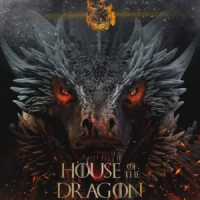
House of the dragon Review
House of the dragon
As a fan of the original series, I stepped into the realm of House of the Dragon with a mixture of anticipation and trepidation. The world of Westeros had captivated millions with its intricate plots, multifaceted characters, and unexpectedly brutal twists. With the promise of a backstory steeped in Targaryen lore, I was eager to discover how this new chapter would unfold. Would it thrive under the weight of expectation, or would it falter against the legacy of its predecessor?
A Rich Tapestry of History
What struck me first about House of the Dragon was the depth of its historical context. Set two hundred years before the events of Game of Thrones, the show draws from George R.R. Martin's novel Fire & Blood. This extensive lore offers an abundance of material to weave into character arcs and political intricacies. The narrative revolves around the Targaryens, whose family history is as fiery as their dragons, featuring themes of ambition, betrayal, and the inevitable clash for power.
This foundational history is not merely a backdrop; it permeates every element of the show. It feels as if the creators have crafted a living, breathing world where the past is always looming, influencing decisions and setting the stage for conflicts. For someone like me who appreciates the nuances of world-building, this rich tapestry is a significant draw, providing layers for characters to navigate and audiences to explore.
Why the Targaryens Captivate
The Targaryen family is undeniably fascinating. With their distinct silver hair and eye-catching dragons, they immediately stand out amid the myriad of characters populating Westeros. However, it’s not merely their appearance that ensnares viewers; it’s their complex legacy and the inherent drama that accompanies their obsession with power. The idea of a dynasty that once ruled with dragons now facing decay and division is compelling.
Throughout the season, I found myself particularly drawn to the concept of legacy—how past actions reverberate through generations. The Targaryens embody this theme as they grapple with their history while forging their paths. Their family dynamics, rife with ambition and rivalry, are reflected in their relationships, illuminating the dark undercurrent of jealousy and resentment. This element not only captivates me but also provides a fertile ground for emotional drama.
Characters Worth Watching
The characters in House of the Dragon offer an engaging array of personalities, each appealing in their own right. Notably, Rhaenyra Targaryen, portrayed by Emma D'Arcy, stands out as a fervent embodiment of ambition tempered by vulnerability. Her journey from the perceived 'heir' to a woman battling for her claim is compelling. Watching her evolve feels organic and relatable; she’s not just a character of privilege but one grappling with the consequences of her lineage.
In contrast, her counterpart, Alicent Hightower, played by Olivia Cooke, represents the political machinations at play. Her unwavering dedication to her family's legacy highlights the tension between loyalty and ambition. Their relationship, which oscillates between friendship and fierce rivalry, mirrors the complex emotional landscapes that define so many human interactions. These dynamic portrayals provide a solid backbone for the larger narrative.
Visuals and Production Value
Visually, the series delivers a stunning feast for the eyes. The intricate costume designs reflect the opulence of Targaryen culture while also underscoring the stark contrast between their world and others in Westeros. Each costume tells a story, whether through color, texture, or detail. I found myself marveling at the craftsmanship, admiring how even minor characters were dressed with a level of care that felt authentic to the setting.
The landscapes are equally captivating, capturing the diverse geography of Westeros. From the charred ruins to the lush green valleys, the cinematography pulls viewers into this world. The dragons, which are glorious manifestations of the Targaryen legacy, soar through the skies, captivating the audience with their visual prowess. Each scene is imbued with a sense of grandeur, yet it’s grounded by the intimate struggles of the characters.
Storytelling Pace
One aspect that stood out to me was the pacing of the story. While I appreciated the focus on character development and the gradual build-up of tensions, there were moments where I felt the narrative stumbled. Some episodes seemed to drag, filled with dialogue that, while rich in detail, often felt like it paused the momentum of the story. I would find myself yearning for a shift, a jolt of action, or perhaps a dramatic twist to foster engagement.
This slower pacing could work in favor of the series if deftly managed; however, there were times when it felt more tedious than enthralling. Engaging in political maneuvering is undoubtedly a signature of the genre, but balance is critical. I found myself occasionally wishing for more action or conflict to maintain my investment in the characters’ journeys.
The Battle for the Throne
Central to the series is the power struggle within the Targaryen family, an intricate web of alliances, betrayals, and aspirations. The conflict is not merely battles with swords but a silent war fought through whispered alliances and public posturing. I appreciated this aspect as it showcases the series' intelligence; it underscores that often, the fiercest battles unfold in the realm of the mind rather than on the battlefield.
This cerebral approach resonates with me, highlighting that true power often lies in strategic thinking rather than overt violence. However, given the series’ name, I admit I expected more fervent clashes and thrilling confrontations. Each character’s ambition provides a rich foundation for tension; when it occasionally resolves into action, it does deliver excitement and satisfaction. Yet, the build-up without an accompanying explosive payoff occasionally left me wanting more.
Moments of Intrigue
One undeniable strength of House of the Dragon is the ability to deliver moments of palpable intrigue. Whether it's a subtle look exchanged between characters or a calculated maneuver to gain the upper hand, these interactions often leave a lasting impression. I found thrill in the depths of these moments, where tension crackled, hinting at the larger political landscape being navigated.
These intricate scenes embody the essence of what I love about stories filled with political intrigue. They manage to hold your attention, drawing you into the character's motivations and desires, even when the action is sparse. I found myself leaning in, captivated, wondering how each character would respond and what unforeseen repercussions would arise from their choices.
Emotional Depth
The emotional stakes in House of the Dragon are elevated by the richness of the character portrayals. Moments of vulnerability shine through, revealing raw humanity beneath their often royal exteriors. I found moments where Rhaenyra or Alicent expressed their inner turmoil to be particularly impactful, offering a glimpse into what drives these characters and how their past shapes them.
This emotional depth resonates beyond mere plot; it connects me to the characters and their journeys. Their struggles—personal loss, familial obligation, desire for power—speak to universal themes that anyone can understand. The weight of regret, the fear of failure, and the longing for acceptance are all beautifully rendered, making the narrative richer and more compelling.
The Dragons: The Heart of the Narrative
No discussion of House of the Dragon would be complete without acknowledging the enormous presence of dragons. These majestic creatures are not merely symbols of power; they embody the essence of Targaryen's identity. The bond between dragons and their riders is central to the narrative, and I found myself awestruck by their depiction. Each dragon possesses its own unique personality, much like its rider, and the interactions are breathtaking.
The moments where dragons take flight not only served as visual highlights but also underscored the euphoria and terror of wielding such power. I relished the scenes where tension mounted, where the imminent threat of dragon fire loomed, reminding me of the weighty symbolism they carried in the narrative. The dragons are dynamic characters in their own right, enhancing the storytelling and evoking admiration and awe.
Themes of Ambition and Betrayal
Thematically, House of the Dragon explores ambition and betrayal in profound ways. Each character navigates the treacherous waters of desire for power, questioning the cost of their ambitions. The ethical dilemmas faced by Rhaenyra, Alicent, and others serve as a reminder that ambition can breed both greatness and destruction. I found the way the show illustrated these themes with a careful hand particularly engaging.
This exploration extends beyond mere character motivations; it invites viewers to question their alignments and moral standings. Each decision echoes throughout the Targaryen lineage, establishing a legacy defined by bloodshed and ambition. The continual wrestle with these themes resonates deeply, enabling organic conversations about what it truly means to pursue power and the lengths one might go to attain it.
An Evolving Narrative
The narrative arc of House of the Dragon is one of evolution. While the buildup can feel slow, there’s a deliberate intention behind it, allowing characters to grow and strive toward their identities. This sense of progression is rewarding, albeit sometimes frustratingly gradual. But as the pieces shift on the board, I become increasingly invested, knowing all the groundwork will eventually spark a transformative shift.
Watching these developments unfold requires a certain level of patience, but it promises eventual reward. I found myself excited for what’s to come, as the narrative evolution has the potential to snowball into something epic—a crescendo that builds on its foundation of carefully crafted character interactions and tension. It’s this promise of what could be that kept me returning for more.
Conclusion: A Journey of Promise
As I reflect on my time spent with House of the Dragon, it’s clear that the series is a fascinating approach to an already established universe. The richness of the story, the intricacies of the characters, and the lingering emotional currents all contribute to its allure. While there were moments where the pacing felt sluggish or where I yearned for more action, the narrative is peppered with intriguing moments that promise future excitement.
Ultimately, House of the Dragon is a journey filled with promise—it’s a complex interplay of ambition, intrigue, and emotional depth set against the backdrop of a world filled with mythical elements. As we continue watching the Targaryens navigate their tumultuous legacy, I’m reminded that storytelling is not merely about the destination but the exploration itself. I’m eager to see how this saga unfolds, and I look forward to delving deeper into the throes of power, familial ties, and the relentless dance of dragons.
House of the dragon

To download the app, you will get links to the Official Website and/or official digital markets.


















